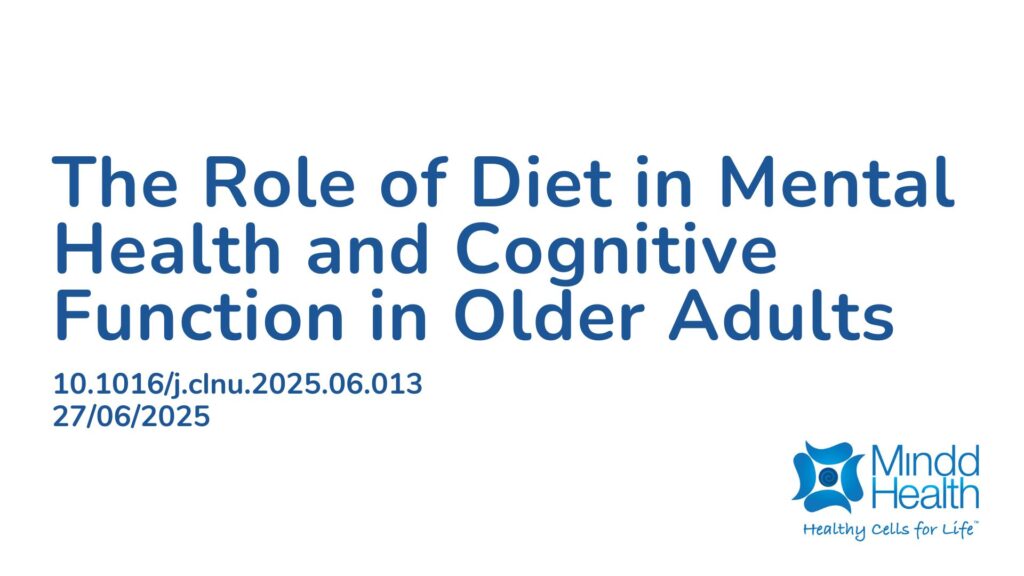Summary:
The rise in life expectancy, influenced by advances in medicine and healthier lifestyles, has led to increased rates of age-related conditions like Alzheimer’s disease (AD), the most common form of dementia. AD is characterized by cognitive decline (e.g memory loss and impaired executive function), changes in behavior, and often includes depressive symptoms. Identifying modifiable risk factors may delay or prevent its onset. Recent studies highlight a strong link between mental health issues such as depression and anxiety, and AD progression. Depression, particularly in older adults, is associated with declines in memory and attention. Nutritional interventions show promise in reducing depressive symptoms and slowing cognitive decline. Diets rich in diverse, nutrient-packed foods, like the Mediterranean (MeDi) and Dietary Approaches to Stop Hypertension (DASH), are linked to improved brain health and reduced AD risk. Healthy dietary patterns, emphasizing fruits, vegetables, fish, and whole grains, are also linked to lower depression risk due to their anti-inflammatory and antioxidative properties. Conversely, diets resembling Western eating habits show mixed effects. This study investigated how dietary patterns moderate the relationship between depression/anxiety symptoms and cognitive function in older adults. Findings suggest that adherence to healthier diets like the MeDi may mitigate negative effects of depression and anxiety on cognitive performance, particularly in males. Understanding these relationships could inform targeted interventions and further research into sex-specific approaches for cognitive health and diet.
Abstract:
Background and aims: Investigating modifiable risk factors, such as diet, is crucial in understanding their effects on the relationship between Alzheimer’s disease (AD)-related cognitive decline and related conditions. This study assesses whether dietary patterns moderate the relationship between symptoms of depression, anxiety, and cognitive function in older adults. Given that biological and psychosocial differences between sexes may influence dietary behaviours, mental health symptoms, and cognitive outcomes, conducting sex-stratified analyses will allow for identification of differential associations. Method: Cross-sectional data from cognitively unimpaired older adults (n=1174, age ≥60 years) from the Australian Imaging, Biomarkers and Lifestyle (AIBL) study were included. Participants completed the Cancer Council of Victoria food frequency questionnaire, provided depression and anxiety symptom data, and underwent neuropsychological testing. Composite scores for six cognitive domains were generated from individual test scores (episodic recall, recognition, executive function, language, attention processing, and the AIBL Preclinical Alzheimer Cognitive Composite (PACC)). Dietary pattern scores were calculated for the Mediterranean diet (MeDi), Dietary Approaches to Stop Hypertension (DASH), and Western diet. Moderation analysis explored interactions between dietary patterns, depression, anxiety, and cognitive performance. Results: The MeDi was found to moderate the relationship between depressive symptoms and attention processing in males, where low to moderate MeDi adherence was linked to poorer attention with higher depressive symptoms. The Western diet moderated the relationship between anxiety and the AIBL PACC score in males, with high adherence to the Western diet associated with worse PACC performance in those with greater anxiety. No significant moderating effects were observed in females for the MeDi and Western diet, or in either sex for the DASH diet on the association of depression and anxiety with cognitive function. Conclusion: These findings also emphasise the importance of sex-specific approaches in research on symptoms of depression and anxiety, cognitive health, and diet. Our results highlight the need for further investigation into sex-specific pathways using longitudinal study designs and randomised controlled trials to establish causal relationships.
Article Publication Date: 27/06/2025
DOI: 10.1016/j.clnu.2025.06.013



